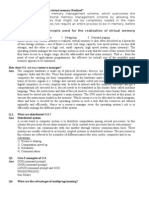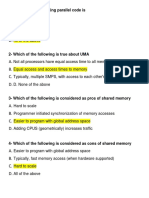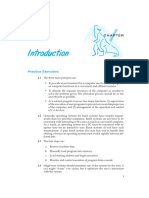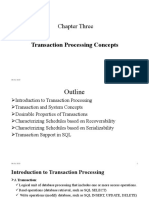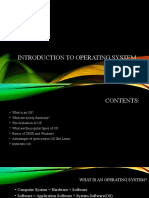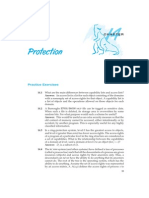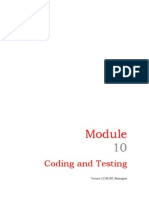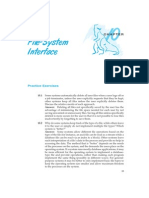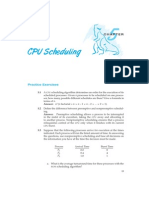Operating System Exercises - Chapter 3-Exr
Uploaded by
evilanubhavOperating System Exercises - Chapter 3-Exr
Uploaded by
evilanubhav3
CHAPTER
Processes
Practice Exercises
3.1 Palm OS provides no means of concurrent processing. Discuss three
major complications that concurrent processing adds to an operating
system.
3.2 The Sun UltraSPARC processor has multiple register sets. Describe the
actions of a context switch if the new context is already loaded into
one of the register sets. What else must happen if the new context is in
memory rather than in a register set and all the register sets are in use?
3.3 When a process creates a new process using the fork() operation, which
of the following state is shared between the parent process and the child
process?
a. Stack
b. Heap
c. Shared memory segments
3.4 Again considering the RPC mechanism, consider the “exactly once” se-
mantic. Does the algorithm for implementing this semantic execute cor-
rectly even if the “ACK” message back to the client is lost due to a network
problem? Describe the sequence of messages and whether "exactly once"
is still preserved.
3.5 Assume that a distributed system is susceptible to server failure. What
mechanisms would be required to guarantee the “exactly once” seman-
tics for execution of RPCs?
You might also like
- Parallel Processing and Concurrent ProcessesNo ratings yetParallel Processing and Concurrent Processes53 pages
- Operating System Concepts Chapter 3 Exercise Solution Part 1No ratings yetOperating System Concepts Chapter 3 Exercise Solution Part 13 pages
- Module 2 - Using The Computer and Managing Files100% (2)Module 2 - Using The Computer and Managing Files101 pages
- CPSC 457 Operating Systems Midterm Exam SolutionNo ratings yetCPSC 457 Operating Systems Midterm Exam Solution9 pages
- Chapter 2 Processes and Process ManagementNo ratings yetChapter 2 Processes and Process Management115 pages
- Exp# 1a Fork System Call Aim: CS2257 Operating System LabNo ratings yetExp# 1a Fork System Call Aim: CS2257 Operating System Lab3 pages
- Operating System Fundamentals Exam - Intake 42 Allowed Time 60 Minutes Tuesday 16 - 11No ratings yetOperating System Fundamentals Exam - Intake 42 Allowed Time 60 Minutes Tuesday 16 - 1120 pages
- Deadlock: Deadlock Can Arise If Following Four Conditions Hold Simultaneously (Necessary Conditions)No ratings yetDeadlock: Deadlock Can Arise If Following Four Conditions Hold Simultaneously (Necessary Conditions)17 pages
- Teacher's Notes - Lec Chapter 5 - Process Synchronization0% (1)Teacher's Notes - Lec Chapter 5 - Process Synchronization7 pages
- Theory of Computation Long Type of Questions-1100% (1)Theory of Computation Long Type of Questions-122 pages
- Chapter 3 Transaction Processing ConceptsNo ratings yetChapter 3 Transaction Processing Concepts40 pages
- 6.823 Computer System Architecture Quiz 1No ratings yet6.823 Computer System Architecture Quiz 115 pages
- Slot14 15 CH08 OperatingSystemSupport 43 SlidesNo ratings yetSlot14 15 CH08 OperatingSystemSupport 43 Slides34 pages
- Processes: Process Concept Process Scheduling Operation On Processes Cooperating Processes Interprocess CommunicationNo ratings yetProcesses: Process Concept Process Scheduling Operation On Processes Cooperating Processes Interprocess Communication27 pages
- Backpropagation: Fundamentals and Applications for Preparing Data for Training in Deep LearningFrom EverandBackpropagation: Fundamentals and Applications for Preparing Data for Training in Deep LearningNo ratings yet
- Operating System Exercises - Chapter 18-SolNo ratings yetOperating System Exercises - Chapter 18-Sol2 pages
- Operating System Exercises - Chapter 14-SolNo ratings yetOperating System Exercises - Chapter 14-Sol2 pages
- Operating System Exercises - Chapter 16-SolNo ratings yetOperating System Exercises - Chapter 16-Sol4 pages
- Operating System Exercises - Chapter 13-Sol100% (1)Operating System Exercises - Chapter 13-Sol4 pages
- Operating System Exercises - Chapter 11-SolNo ratings yetOperating System Exercises - Chapter 11-Sol4 pages
- Operating System Exercises - Chapter 9 SolNo ratings yetOperating System Exercises - Chapter 9 Sol6 pages
- Operating System Exercises - Chapter 10-Sol100% (1)Operating System Exercises - Chapter 10-Sol4 pages
- Operating System Exercises - Chapter 5-ExrNo ratings yetOperating System Exercises - Chapter 5-Exr2 pages











